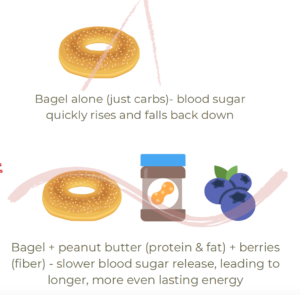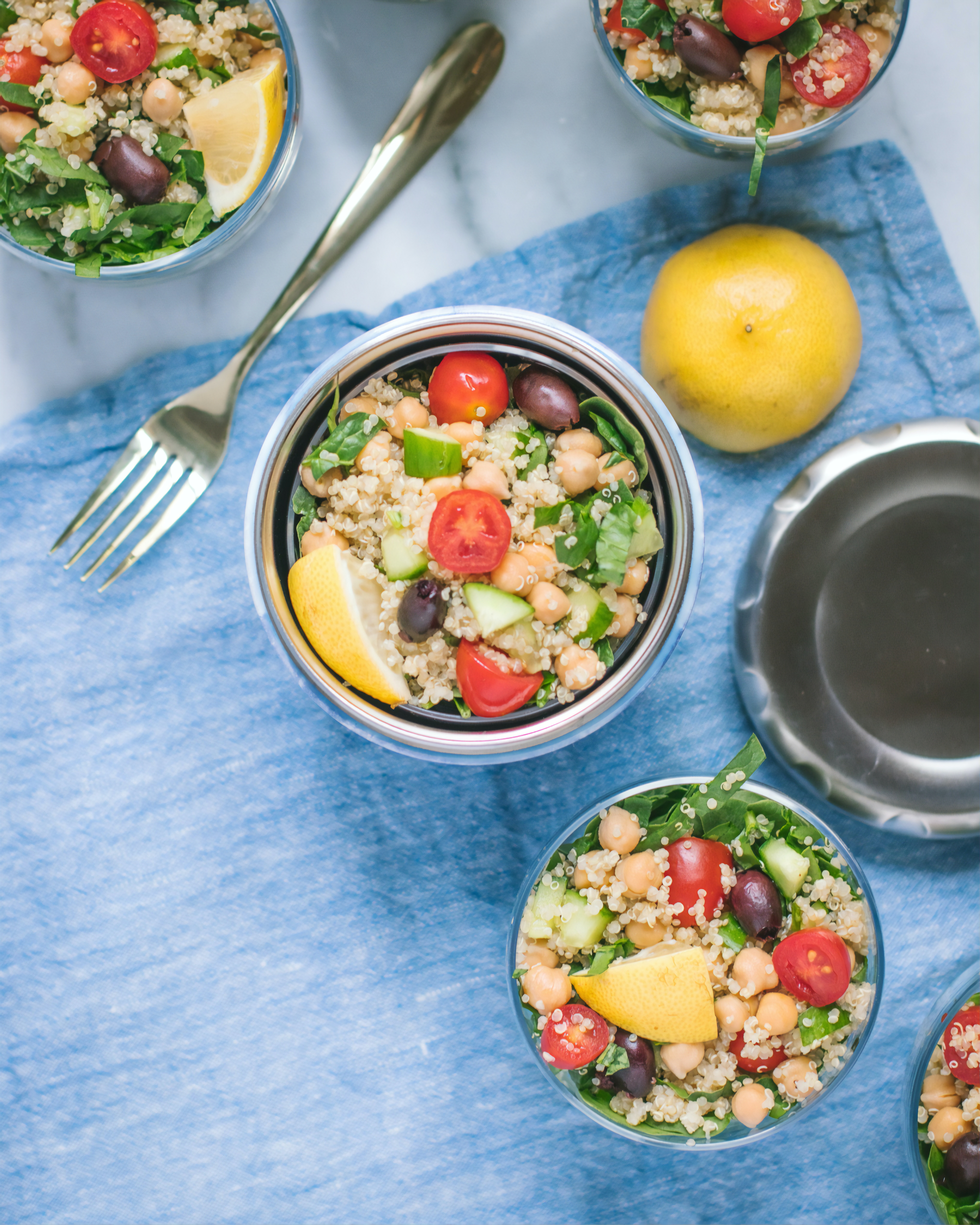Did you know? Blood sugar affects everything from your energy levels, your mood, your metabolism, and your hunger and fullness cues on a day to day basis. Even if you don’t have Diabetes or blood sugar issues, it’s still imperative to have knowledge of how blood sugar affects you on the daily so you can feel your best. So let’s discuss blood sugar balance and discover why it is is so vital for your health.
What is blood sugar?
Whenever we consume any form of carbohydrate (whether it be from an apple or a piece of cake), it is then broken down into a single sugar molecule, called glucose. So the term ‘blood sugar’ refers to the amount of this glucose, or sugar, circulating in the bloodstream at any given time. When you go to the doctor to get labwork done, they may check your fasting glucose, which is checking for this blood sugar in afasted state. You may also heard of getting your A1C level checked (which is the diagnostic marker to check for Diabetes). The A1C is a 3 month average of your blood sugar levels, so it’s a much more accurate representation of your blood sugar levels overall. Blood sugar plays a vital role in mood and energy regulation.

How does blood sugar work?
Once again, anytime we consume carbohydrates, they are then broken down into glucose, whether it’s from fruit, dairy, grains, or sweets. Glucose is then directed by insulin, a hormone secreted by the pancreas, to be sent into the cells to be used for energy. As the cells absorb blood sugar, levels in the bloodstream begin to fall. Then, the pancreas starts making glucagon, another hormone that signals the liver to start releasing stored sugar. This delicate interplay of insulin and glucagon ensure that cells throughout the body, and especially in the brain, have a consistent reserve of blood sugar.
Having a balance of blood sugar levels throughout the day is important – we want them to be just right; not too high, not too low. Blood sugar helps dictate our mood, our weight regulation, our hunger and fullness, our energy levels, and even our cravings. Therefore having balanced blood sugar helps keep our brain sharp, our energy levels consistent and our mood stable. However, when out of whack, imbalanced blood sugar can lead to the opposite: increased sugar cravings, irritability (“hanger” is a real thing), poor sleep, brain fog, anxiety, low energy and weight gain, and even long term, Diabetes.
If we don’t eat ENOUGH carbs, we aren’t getting this critical glucose for energy, mood regulation, and brain function. This would show up as low blood sugar if you were to test your blood levels. Symptoms may look like dizziness, shakiness, blurred vision, fatigue, sweating, fast heartbeat, hunger, confusion, and irritability.
We also don’t want the other extreme either; we don’t want our blood sugar to always be running too high. This could lead to insulin resistance, in which the pancreas essentially can’t keep up with the amount of insulin needed to help control blood sugar levels. In turn, the body becomes less efficient at secreting insulin and therefore blood sugar levels stay consistently high. Diabetes is a medical condition in which there are chronic high levels of circulating blood sugar. Eventually, high blood sugar levels can lead to disorders of the circulatory, nervous and immune systems.
Signs and symptoms of high blood sugar include increased thirst, unintentional weight loss, increased urination, tiredness, blurred vision, and recurrent infections.
So, overall this is why it’s important to have a normal balance of blood sugar levels throughout the day. We need to include carbohydrates in our diet (we NEED blood sugar – no low carb diets!!), and it’s helpful to understand what factors can help keep tour blood sugar balanced to feel your best.
What causes imbalanced blood sugar?
Imbalanced blood sugar can be caused from a variety of factors – but food intake and lifestyle plays a very large role.
- Not eating frequently enough
- Eating unbalanced meals (no carbs or too many carbs)
- Excess sugary beverages
- Disrupted sleep
- Poor stress management
- Lack of, or excess, physical activity
- Skipping meals
- Lack of fiber in the diet
- Eating disorders
So, how do you balance blood sugar?
There are a few things that can help balance your blood sugar. One is eating consistently, and avoiding going more than 5+ hours without anything to eat. When blood sugar dips low from time after your last meal or snack, our bodies crave any quick form of glucose (aka sugar, concentrated carbs) to quickly raise it back to normal, so this is when sugar cravings will hit. This is when ‘caveman’ hunger comes in – our primal drive to get any food, STAT! (Another reason that snacks can be so helpful – they help prevent us from getting to that state of primal hunger, when all notions to eat consciously go out the window).
Something else that can help manage blood sugar is pairing carbohydrates with protein, fat, and fiber. Protein, fat, and fiber help to slow down the digestion of carbs, and therefore slow down the glucose absorption in the body. This leads to longer energy and more balanced blood sugar levels, without the spikes (quick rise in energy followed by a crash).

Other general tips that help balance blood sugar include incorporating consistent forms of movement that you enjoy, getting adequate sleep, managing stress, and incorporating more whole grains and whole foods, since they naturally have more fiber.
All in all, the best and easiest way to balance your blood sugar is by considering these 3 simple things:
- Try to avoid skipping meals – eat regular meals and snacks roughly every 3-4 hours, which mimics the natural blood sugar response. I usually encourage my clients to aim for 3 meals and at least 2 snacks every day! Remember, there is no such thing as perfection, so if you miss the mark one day, instead of getting judgmental, get curious. Skipped breakfast and overate lunch? Figure out what led you to skip breakfast and set goals to help incorporate breakfast tomorrow.
- Eat balanced meals and snacks with carbs, protein, fat, and fiber: Try filling your plate with “CPFF” – a source of carbs, protein, fat, and fiber. Some examples could look like:
- Whole grain toast with eggs, cheese, and spinach with a side of fruit
- trail mix with whole grain cereal, chocolate chips, dried fruit, and nuts
- Stir fry with rice, chicken, veggies, soy sauce, etc.
- Apple and peanut butter (one of my favorite snacks!)
- Baked salmon, broccoli, and a roll with butter
- Choose carbohydrates with fiber (such as whole grains) most of the time (doesn’t have to be all of the time!) Once again, pairing carbs with protein, fat, and fiber can be very helpful for balanced blood sugar. Therefore an easy way to do this is by choosing carbs that already have fiber included! This includes your whole grains (quinoa, brown rice, whole grain bread, popcorn, etc.) as well as vegetables that have both carbs and fiber (such as potatoes, beans, corn), and whole fruits (so many to choose from!). There is absolutely still a place for quick carbs in our diet (such as a delicious cookie or white roll), it’s all about knowledge of how these foods work in our body, and pairing them with other foods with protein, fat, or fiber sometimes. It’s also knowing that what matters most for our health is our overall average of habits, so eating a meal or snack with too many carbs isn’t going to all of a sudden make or break our health. Our habits are an average. 🙂

Can I be mindful of balancing my blood sugar and also eat intuitively?
YES, Absolutely! This is when gentle nutrition comes into play. Because remember, nutrition isn’t neglected in intuitive eating. Until you’re able to eliminate food rules and work through diet mentality though, it can be difficult to look at basic nutrition science without turning it into a hard and fast rule.
Understanding that we feel best (once again we have more stable mood and energy levels) when we eat regular meals and snacks is something that absolutely aligns with intuitive eating. If we are learning to tune into our bodies, you may find that it doesn’t feel too great to skip a meal, feel shaky and overly hungry, and then overeat at the next meal.
What we want to avoid when it comes to blood sugar control are rigid rules, judgement, guilt when eating certain foods, and anything else diet-aligned. For example, instead of making a food rule such as, “I can’t have any white flour, I have to always have whole grains.” Focus instead on gentling incorporating whole grains that you genuinely enjoy when you can! Hate brown rice, but love oats? Cool! Where can you add those whole grains in, while also giving yourself permission to enjoy other foods at times? Depending on where you are in regards to your relationship to food and your health, I always recommend working 1:1 with an experienced Registered Dietitian to help support you with your individualized goals.
I also find that my clients become much more aware of their blood sugar balance when they start to tune into their hunger and fullness cues. When we start eating consistently, and our hunger cues become more reliable, that’s an easy cue by the body that your blood sugar levels may be changing. Feeling a dip in energy, your stomach grumbling, and feeling a bit irritable? Low blood sugar – time to honor your hunger!
All in all, when it comes to balancing blood sugar and intuitive eating, it’s focusing on making flexible food and lifestyle choices for self-care, rather than self-control.
Have more questions regarding blood sugar? Contact me today!
Get My 20 Favorite Recipes!
Get ready for some yummy food with my 20 favorite recipes. Receive an instant download to inspire you on your journey to nourishment!
Follow me on Instagram!
@CAROLINEGREENNUTRITION
© Copyright 2023 Caroline Green Nutrition. All Rights Reserved. Branding and Website Design by Chloe Creative Studio.
